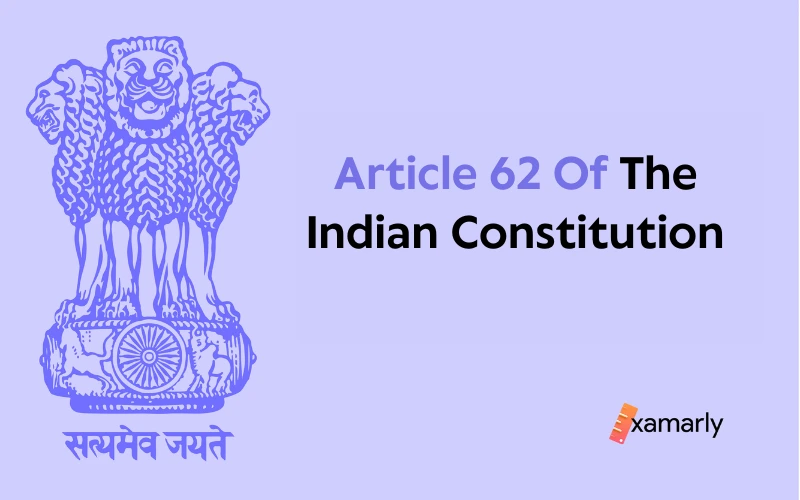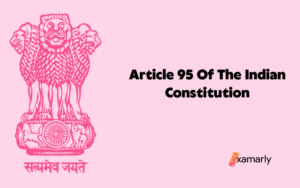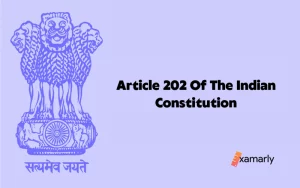Article 62 of the Indian Constitution was addressed in Part V of the Constitution. Part V comprises five chapters. The qualifications, election, and impeachment of the President of India are outlined in Chapter I. Chapter 1 (The Executive) provided room for Article 62.
Read this article to learn all about article 62 of the constitution of India.
What is Article 62 All About?
The focus of Article 62 is on the timing of elections to fill presidential vacancies and the terms of office of those elected to do so.
Clause 1 of Article 62
Before the term’s end, a vote must be held to replace a vacancy brought on by the expiration of the president’s time in office.
Clause 2 of Article 62
When a vacancy in the office of President arises due to a person’s death, resignation, removal, or other reason, there must be an election to fill it as soon as possible, but no later than six months after the vacancy first occurred.
As long as the provisions of article 56 are met, the individual chosen to fill the vacancy will be able to hold onto their position for the whole five years, starting on the day they start working.
Constituent Assembly Debate
On December 28, 1948, the Constituent Assembly discussed the draft of Article 51 (Article 62, Constitution of India 1950). It outlines the steps and requirements for filling vacancies in the President’s office.
There were just two criticisms of the article. First, a newly elected president would serve a term of five years, regardless of how long the outgoing president had been in office. This was outlined in Clause 2, second section.
As a result, the terms of the President and the Parliament would not coincide. A member took issue with this because they believed the two terms needed to run concurrently to prevent the President from meddling in Parliamentary elections.
Another member argued that the Draft Article did not adequately address the transitional period between the removal, death, or resignation of one President and the election of a new President.
In response to these queries, the Chairman of the Drafting Committee spoke. He began by stating that there was no justification for a freshly elected President to hold office for a term shorter than five years.
Second, he claimed that Draft Article 54 covered the transitional time between the outgoing and incoming Presidents.
Without modification, the Draft Article was approved.
Check out the linked articles from the table given below to prepare for IAS Exam.
| Article 54 of the Indian Constitution | Article 57 of the Indian Constitution |
| Article 58 of the Indian Constitution: Qualifications for election as President | Article 60 of the Indian Constitution |
| Article 356 of the Indian Constitution | Article 365 of the Indian Constitution |
| Article 84 of the Indian Constitution: Qualification for membership of Parliament | Advisory Jurisdiction of Supreme Court |
| Article 102 of the Indian Constitution: Disqualifications for membership of either House of Parliament | Article 66 of the Indian Constitution: Vice-President’s election |
Conclusion
Article 62 of the Indian Constitution states “Time of holding election to fill a casual vacancy in the office of President and the term of office of person elected to fill casual vacancy.”
This means that an election to fill a vacancy brought on by the expiration of the President’s term of office must be finished prior to the term’s expiration, as explained above.
FAQs
What is the term of the office of President?
The President of India is required under Article 56 of the Indian Constitution to serve a five-year term beginning on the day he assumes office. He can resign from his position by sending a letter of resignation to India’s vice president. Nevertheless, despite having submitted his resignation, he will hang onto his position until his replacement assumes it. Additionally, a similar election ought to be held before he leaves office.
What is Article 62(2)?
Article 62 (2) states that an election to replace a vacancy in the office of the President resulting from his death, resignation, removal, or other reason must be held as soon as feasible and in no instance later than six months from the date the vacancy occurred. The person who is chosen to fill the vacancy will have the right, subject to the conditions of article 56, to retain office for the full five years beginning on the day he assumes his duties.
What is the principle of election used in the selection of the President?
Using a single transferable vote to implement proportional representation.
What are the procedures for choosing a President?
The position of the Indian President is not up for direct election. He is chosen by an electoral college consisting of:
a. Rajya Sabha and Lok Sabha
b. States’ legislative assemblies (Legislative Councils have no role)
c.the legislative assemblies of Delhi and Puducherry, both union territories
In which Part of the Indian Constitution was Article 62 laid down?
The provisions of Article 62 of the Indian Constitution were discussed in Part V of the Constitution.






